大学英语知识点总结
大学英语基础知识点大一

大学英语基础知识点大一大学英语对于大一新生来说是一个重要的学科,它涵盖了基本的英语语法、词汇、阅读、听力和写作技巧。
本文将介绍一些大学英语基础知识点,帮助大一新生更好地应对这门学科。
一、英语语法英语语法是英语学习的基础,以下是一些重要的语法知识点:1. 时态:英语有多种时态,如一般现在时、过去时、将来时等。
掌握各种时态的用法和构成对于正确运用英语至关重要。
2. 语态:英语有主动语态和被动语态两种形式。
学生需了解被动语态的构成和使用场景。
3. 从句:学习掌握名词性从句、定语从句和状语从句等不同类型的从句,并能正确使用它们。
二、英语词汇扩大词汇量是提高英语水平的关键。
以下是一些建议:1. 单词记忆:利用词卡、手机应用等工具,记忆常用单词的拼写、发音和意义。
2. 词根词缀:学习一些常用的词根和词缀,可以帮助理解和记忆更多的单词。
3. 同义词和反义词:了解词汇的近义词和反义词,可以帮助丰富表达方式。
三、英语阅读阅读是提高英语综合能力的重要途径。
以下是一些提高英语阅读能力的方法:1. 阅读量:多读英语文章,包括新闻、故事、杂志等。
逐渐提高阅读难度,培养阅读理解能力。
2. 阅读技巧:学习使用略读、扫读、精读等不同的阅读技巧,提高阅读速度和理解力。
3. 生词学习:遇到不认识的生词时,学会通过上下文猜测词义,不必查字典。
四、英语听力听力是英语学习中的一项重要技能,以下是一些建议:1. 多听英语材料:如英语音乐、电影、电视剧和英语教材中的录音等。
通过多听,提高对英语语音、语调和表达方式的理解。
2. 留意听力材料的难度:初学阶段,选择适合自己的听力材料,逐渐增加难度。
3. 笔记记录:听英语材料时,可以同时记录重要的信息,以便后续复习和理解。
五、英语写作写作是对英语学习成果的输出,以下是一些写作技巧:1. 句型和连词的使用:学习一些常用的句型和连接词,使文章结构更加清晰和紧凑。
2. 逻辑思维:构思文章时,要注意逻辑关系和段落间的过渡,使文章条理清晰。
大学英语知识点总结归纳

大学英语知识点总结归纳一、语法知识点1. 英语句子的基本构成英语句子的基本构成包括主语、谓语、宾语等,根据不同的语法成分可以分为简单句、并列句、复合句等多种形式。
掌握句子的基本构成对于语言的准确表达和理解至关重要。
2. 时态英语中的时态包括一般现在时、一般过去时、一般将来时、现在进行时、过去进行时、现在完成时、过去完成时等。
时态的正确使用可以使语言表达准确清晰。
3. 语态英语中的语态包括主动语态和被动语态,正确使用语态可以使表达更加灵活多样。
4. 语气英语中的语气包括陈述语气、疑问语气、祈使语气等,每种语气的使用都有其特定的情境和表达方式。
5. 并列连词和从属连词并列连词用于连接并列结构的词、短语、从句等,包括and、or、but等;从属连词用于连接主从复合句,包括because、when、although等。
6. 形容词和副词的比较级和最高级形容词和副词的比较级和最高级形式可以用于比较不同事物的程度和大小。
7. 定冠词和不定冠词定冠词包括the,不定冠词包括a和an,使用时需要根据名词的情境和特点正确选择。
8. 代词代词分为人称代词、物主代词、反身代词、指示代词等,根据情境需要选择正确的代词形式。
9. 主谓一致主谓一致是指主语和谓语在人称和数上保持一致,是英语句子中的重要语法规则。
10. 介词介词用于连接名词、代词、动词或形容词等,构成介词短语用于修饰其他成分,掌握介词的使用可以使语言表达更加丰富。
二、词汇知识点1. 单词的拼写和发音掌握英语单词的拼写和发音是学习英语的基本功,有助于提高语言表达的准确性。
2. 同义词和反义词同义词和反义词可以丰富语言表达的方式,帮助学习者避免重复使用相同的词汇。
3. 词汇搭配词汇搭配是指在语言表达中,词语之间常常有固定的搭配关系,如动词搭配介词、名词搭配形容词等,掌握词汇搭配可以使表达更加自然流畅。
4. 词义辨析英语中存在大量近义词和异义词,学习者需要掌握它们的区别和正确用法,避免混淆。
大学英语3考试知识点总结

大学英语3考试知识点总结大学英语3是大学英语课程的一部分,是一门重要的课程。
在大学英语3考试中,通常包括听力、阅读、写作和口语等方面的考核。
要在考试中取得好成绩,就需要对大学英语3的相关知识点进行系统地总结和复习。
下面将对大学英语3的各个知识点进行详细总结:听力部分在大学英语3的听力考试中,通常考查考生的听力理解能力。
考生需要听懂各种口音和语速的英语,理解并抓住主要信息和细节信息。
因此,考生需要掌握一定的听力技巧,如预测题目内容、注意关键词、利用上下文推测意思等。
在进行听力复习时,考生可以选择一些与大学英语3听力内容相近的英语电影、英语新闻等进行听力练习,提升自己的听力水平。
在练习时,务必注意听力材料的多样性,包括不同口音、语速、语调、背景噪音等,以帮助自己适应多样化的听力考试内容。
阅读部分在大学英语3的阅读考试中,考生需要阅读一些英语文章或故事,理解并回答相关问题。
阅读题目可能包括多项选择、配对、填空等形式。
因此,考生需要培养自己的阅读理解能力。
在进行阅读复习时,考生可以选择一些英语原版书籍、报纸、杂志等进行阅读练习。
同时,要注重积累一些英语词汇和表达方式,以提高自己的阅读速度和理解能力。
还可以通过做一些阅读模拟题,提升自己的应试能力。
写作部分在大学英语3的写作考试中,考生需要根据所给的题目,写一篇短文或文章。
写作内容通常涉及日常生活、社会热点、文化交流等方面。
因此,考生需要具备一定的语言表达能力和逻辑思维能力。
在进行写作复习时,考生可以选择一些与写作题目相关的话题进行练习,培养自己的写作习惯和创作能力。
同时,要注重积累一些常用的句型、短语和表达方式,以提高自己的语言表达能力。
还可以通过做一些写作练习题,提升自己的写作水平。
口语部分在大学英语3的口语考试中,考生需要进行口头表达,回答问题、描述图片或文章等。
口语考试通常要求考生具备一定的口语表达能力和语音语调准确。
因此,考生需要进行口语练习,提升自己的口语表达能力。
大一综合英语教程知识点
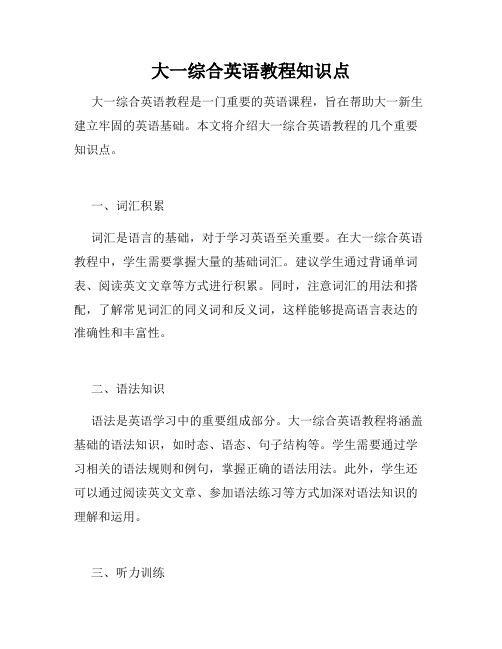
大一综合英语教程知识点大一综合英语教程是一门重要的英语课程,旨在帮助大一新生建立牢固的英语基础。
本文将介绍大一综合英语教程的几个重要知识点。
一、词汇积累词汇是语言的基础,对于学习英语至关重要。
在大一综合英语教程中,学生需要掌握大量的基础词汇。
建议学生通过背诵单词表、阅读英文文章等方式进行积累。
同时,注意词汇的用法和搭配,了解常见词汇的同义词和反义词,这样能够提高语言表达的准确性和丰富性。
二、语法知识语法是英语学习中的重要组成部分。
大一综合英语教程将涵盖基础的语法知识,如时态、语态、句子结构等。
学生需要通过学习相关的语法规则和例句,掌握正确的语法用法。
此外,学生还可以通过阅读英文文章、参加语法练习等方式加深对语法知识的理解和运用。
三、听力训练大一综合英语教程中的听力训练旨在提高学生的听力理解能力。
学生需要通过听取英文材料,如短对话、新闻报道等,锻炼自己的听力技巧。
在听力过程中,学生可以注意关键词的捕捉,理解说话者的意图和信息主旨。
同时,可以多听多练,提高听力的准确度和速度。
四、口语表达口语表达是英语学习中的重要环节。
大一综合英语教程中,学生需要进行口语练习,提高自己的口语表达能力。
学生可以通过模仿和跟读来提高发音准确性,同时注重语音语调的把握。
此外,学生还可以参加英语角、口语训练班等活动,与他人进行交流,提高口语表达的流利度和自信心。
五、写作技巧写作是英语学习的重要组成部分。
在大一综合英语教程中,学生需要学习写作技巧,如段落组织、句子连接、篇章结构等。
学生可以通过阅读优秀的英文作品,了解写作的特点和技巧。
同时,练习写作,如写日记、写文章等,不断提高自己的写作能力。
六、阅读理解阅读理解是提高英语综合能力的重要途径。
在大一综合英语教程中,学生将接触到各种类型的英文阅读材料,如新闻、文学作品、科技文章等。
学生需要通过阅读,提高自己的阅读理解能力,包括理解文章的主旨、细节和推理等。
建议学生进行大量的阅读训练,扩展自己的阅读广度和深度。
大学英语四级知识点总结

大学英语四级知识点总结大学英语四级知识1as…as1.基本用法该结构的基本意思是“与……一样”,其中接形容词或副词的原级,在否定句中,第一个as也可换成so.如:He doesn't study as [so] hard as his brother. 他学习不如他弟弟努力。
2.涉及数量或程度的用法若涉及数量或程度,可用“as much+不可数名词+as”和“asmany+可数名词复数+as”。
如:He doesn‘t pay as much tax as we do / as us. 他没我们交的税款多。
There are not as many restaurants as there were. 现在餐馆没有过去多了。
3.有关词序的一点说明其间接形容词时,有时该形容词还可修饰另一名词,但这个名词应带有不定冠词(注意词序)。
如:I have as good a voice as you. 我的声音和你一样好。
4.该结构的修饰语根据情况可用(not) nearly, almost, just, nothing like, exactly, not quite, half, one-ten, twice, threetimes, 30 per cent等修饰,并且这些修饰语必须置于第一个as之前,而不能置于其后。
如:This room is twice as large as that one. 这个房间是那个房间的两个大。
You‘re not half as clever us you think you are. 你远不是自己想像的那么聪明。
It took three times as long as I had expected. 这件事比我预料的多花了两倍的时间。
大学英语四级知识2first & at first1、从词性上看区别first可用作形容词或副词,有时还可用作代词;而at first 作为介词短语,只起副词用作用(在句中用作状语)。
大学英语期末知识点大一

大学英语期末知识点大一大学英语是大一学生必修的一门课程,它的内容丰富多样,包括英语单词、语法、阅读理解、听力和口语等方面的知识。
下面将针对大学英语期末考试的几个重要知识点进行详细介绍。
一、英语单词掌握一定量的英语词汇是理解和应用英语语言的基础。
在期末考试中,通常会涉及词汇选择、词义辨析以及填空等题型。
为了提高词汇量,我们可以通过背单词卡片、词汇书以及在线词汇学习工具来进行学习。
此外,利用单词在句子中的实际运用场景,可以加深对单词的记忆。
二、语法知识掌握英语语法是理解和构建正确句子的基础。
在期末考试中,语法知识主要体现在填空、改错和翻译等题型中。
常见的语法知识点包括时态、语态、虚拟语气、从句和介词等。
我们可以通过阅读语法书籍、练习语法题以及做语法习题来加强对语法知识的掌握。
三、阅读理解阅读理解是大学英语考试的重要组成部分。
在期末考试中,通常会涉及短文的理解、主旨概括、细节把握以及文章写作意图等方面的题目。
为了提高阅读理解能力,我们可以多读英语文章,培养阅读习惯和速度,并学会使用扫读和略读等阅读技巧。
四、听力听力是大学英语考试的另一个重要部分。
期末考试中,听力部分通常包括听对话、听短文和听长对话等。
要提高听力能力,我们可以多听英语材料,如英语歌曲、电影、英语广播等,锻炼自己的听力理解能力。
同时,可以通过做听力练习题和模拟考试,提高对于听力材料的理解和把握。
五、口语口语是英语学习的重要环节之一。
在期末考试中,通常会有口语考试的部分。
为了提高口语表达能力,我们可以多与他人进行英语对话,加入英语角或者组织口语交流活动。
此外,可以模仿英语原声录音或者参加英语口语培训班,提高自己的发音和口语表达能力。
总结起来,大学英语期末考试的知识点主要包括英语单词、语法、阅读理解、听力和口语。
要想在考试中取得好成绩,我们需要通过积极学习相关知识,掌握相关技巧,并进行充分的练习和训练。
只有融会贯通,才能在大学英语的学习中取得好成绩。
大学英语教材重点知识归纳

大学英语教材重点知识归纳大学英语是大学本科阶段必修的一门课程,为培养学生的英语语言能力和跨文化交际能力提供了重要支持。
在大学英语教材中,有一些重点知识点对于学生的学习和应用至关重要。
本文将对大学英语教材中的重点知识进行归纳总结,以便学生更好地复习和掌握。
一、语法知识1. 时态和语态大学英语教材中常涉及到各种时态和语态的使用,在句子中起到不同的作用。
包括一般现在时、一般过去时、现在进行时、过去进行时、过去完成时等。
同时,被动语态也是学生需要掌握的重要语法知识。
2. 从句从句是大学英语教材中常见的句型结构,包括定语从句、宾语从句和状语从句等。
学生需要理解从句的引导词和从句与主句之间的逻辑关系,正确运用从句来更好地表达自己的观点和意图。
3. 句子结构在大学英语教材中,常出现复杂的句子结构,如并列句、复合句等。
学生需要学会使用适当的连词和标点符号,使句子结构清晰,逻辑性强。
二、词汇知识1. 同义词与反义词大学英语教材中常包含大量的同义词和反义词,学生需要学会辨析它们的词义和用法,以便更好地理解文章的意思。
2. 词根和词缀学生需要学会词根和词缀的基本含义和用法,通过拆解词根和词缀来理解和记忆词汇,提高自己的词汇量和词汇应用能力。
三、阅读理解1. 阅读技巧大学英语教材中的阅读材料常涉及到各种文章类型,学生需要学会使用有效的阅读技巧,如快速阅读、略读和精读,以便更好地理解文章的主旨和细节。
2. 阅读策略阅读理解过程中,学生需要掌握一些阅读策略,如预测、推理和归纳等,以帮助他们更好地理解文章的意义和结构。
四、口语和写作1. 口语表达大学英语教材中的口语练习常涉及到日常对话、演讲和辩论等。
学生需要学会流利地表达自己的观点,使用正确的语音语调和灵活运用词汇。
2. 写作技巧写作是大学英语教材中的重要部分,学生需要学会合理组织文章结构,使用恰当的词汇和句型,有效地表达自己的思想和观点。
通过对大学英语教材中的重点知识进行归纳总结,学生可以更有针对性地进行学习和复习。
大学英语语法知识点总结
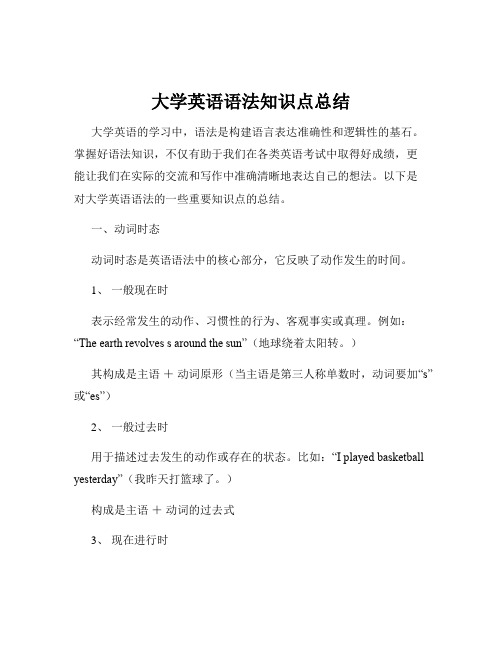
大学英语语法知识点总结大学英语的学习中,语法是构建语言表达准确性和逻辑性的基石。
掌握好语法知识,不仅有助于我们在各类英语考试中取得好成绩,更能让我们在实际的交流和写作中准确清晰地表达自己的想法。
以下是对大学英语语法的一些重要知识点的总结。
一、动词时态动词时态是英语语法中的核心部分,它反映了动作发生的时间。
1、一般现在时表示经常发生的动作、习惯性的行为、客观事实或真理。
例如:“The earth revolves s around the sun”(地球绕着太阳转。
)其构成是主语+动词原形(当主语是第三人称单数时,动词要加“s”或“es”)2、一般过去时用于描述过去发生的动作或存在的状态。
比如:“I played basketball yesterday”(我昨天打篮球了。
)构成是主语+动词的过去式3、现在进行时表示正在进行的动作。
像:“He is reading a book now”(他正在读书。
)结构为:主语+ be 动词(am/is/are)+动词的现在分词4、过去进行时强调过去某个时刻正在进行的动作。
例如:“I was doing myho mework at 8 o'clock last night”(昨晚八点我正在做作业。
)其形式为:主语+ was/were +动词的现在分词5、现在完成时表示过去发生的动作对现在造成的影响或结果,或者过去的动作一直持续到现在。
例如:“I have finished my work”(我已经完成了工作。
)由“主语+ have/has +动词的过去分词”构成6、过去完成时表示过去某一时间或动作之前已经发生或完成的动作。
例如:“By the end of last year, I had learned 5000 words”(到去年年底,我已经学了5000 个单词。
)结构为:主语+ had +动词的过去分词7、一般将来时用以表达将来要发生的动作或存在的状态。
大学英语教材英语三知识点总结
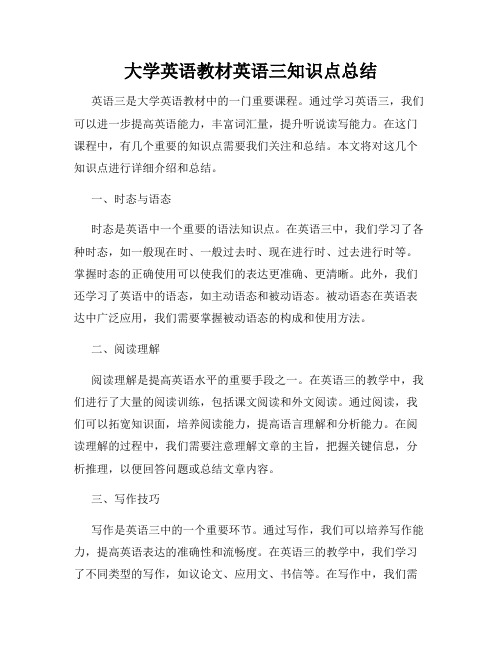
大学英语教材英语三知识点总结英语三是大学英语教材中的一门重要课程。
通过学习英语三,我们可以进一步提高英语能力,丰富词汇量,提升听说读写能力。
在这门课程中,有几个重要的知识点需要我们关注和总结。
本文将对这几个知识点进行详细介绍和总结。
一、时态与语态时态是英语中一个重要的语法知识点。
在英语三中,我们学习了各种时态,如一般现在时、一般过去时、现在进行时、过去进行时等。
掌握时态的正确使用可以使我们的表达更准确、更清晰。
此外,我们还学习了英语中的语态,如主动语态和被动语态。
被动语态在英语表达中广泛应用,我们需要掌握被动语态的构成和使用方法。
二、阅读理解阅读理解是提高英语水平的重要手段之一。
在英语三的教学中,我们进行了大量的阅读训练,包括课文阅读和外文阅读。
通过阅读,我们可以拓宽知识面,培养阅读能力,提高语言理解和分析能力。
在阅读理解的过程中,我们需要注意理解文章的主旨,把握关键信息,分析推理,以便回答问题或总结文章内容。
三、写作技巧写作是英语三中的一个重要环节。
通过写作,我们可以培养写作能力,提高英语表达的准确性和流畅度。
在英语三的教学中,我们学习了不同类型的写作,如议论文、应用文、书信等。
在写作中,我们需要掌握一些常用的写作技巧,如清晰的段落结构、连贯的语言表达、恰当的过渡词使用等。
此外,我们还需要注意语法和拼写错误,避免给读者造成困扰。
综上所述,英语三是大学英语教材中的一门重要课程。
通过学习英语三,我们可以提高时态与语态的正确使用、培养阅读理解能力和提升写作水平。
这些知识点对我们今后的学习和工作都具有重要意义。
因此,我们应该认真对待英语三的学习,不断巩固和运用所学知识,以提升自己的英语能力。
希望本文对同学们在英语三的学习中有所帮助。
大学必备英语知识点总结

大学必备英语知识点总结1. Grammar Rules:a. Parts of Speech: Understanding the basic parts of speech in English, including nouns, pronouns, verbs, adjectives, adverbs, prepositions, conjunctions, and interjections. It is crucial to know how each part of speech functions within a sentence and how they relate to one another.b. Sentence Structure: Knowing how to construct and analyze different types of sentences, such as simple, compound, complex, and compound-complex sentences. Understanding subject-verb agreement, parallelism, and proper punctuation is also essential for constructing grammatically correct sentences.c. Verb Tenses: Mastery of verb tenses, including present, past, and future tenses, as well as perfect and progressive forms of each. Understanding when and how to use each tense is vital for effective communication.d. Articles and Determiners: Knowing the rules for using articles (a, an, the) and determiners (this, that, these, those) to modify nouns and provide context within a sentence.e. Modifiers and Phrases: Understanding how to use modifiers (adjectives and adverbs) to add detail and description to sentences, as well as recognizing different types of phrases (prepositional, gerund, infinitive) and how to use them effectively.2. Vocabulary:a. Word Roots, Prefixes, and Suffixes: Understanding the meaning and usage of common word roots, prefixes, and suffixes can help expand vocabulary and decipher the meanings of unfamiliar words.b. Synonyms and Antonyms: Learning synonyms (words with similar meanings) and antonyms (words with opposite meanings) can help students express themselves more accurately and effectively.c. Idioms and Phrasal Verbs: Familiarizing oneself with common idiomatic expressions and phrasal verbs can enhance fluency and comprehension in spoken and written English.d. Academic Vocabulary: Developing a strong grasp of academic vocabulary related to specific fields of study is essential for success in college coursework.e. Contextual Understanding: Learning to infer the meaning of unfamiliar words based on context clues and familiar word parts is a valuable skill for expanding vocabulary.3. Communication Skills:a. Reading Comprehension: Developing the ability to comprehend and analyze written texts, including recognizing main ideas, supporting details, and inferences, as well as evaluating the credibility and relevance of sources.b. Writing Skills: Mastering the process of writing, including prewriting (planning and organizing ideas), drafting, revising, editing, and proofreading, as well as understanding different types of essays (narrative, descriptive, expository, persuasive, and argumentative).c. Speaking and Listening: Improving oral communication skills, including public speaking, active listening, and effective interpersonal communication, is essential for success in both academic and professional settings.d. Critical Thinking: Developing the ability to think critically, analyze information, and make logical, evidence-based arguments is crucial for success in college-level academic writing and discourse.e. Research Skills: Understanding how to conduct research, evaluate sources, and cite information ethically and accurately is essential for academic integrity and success in college coursework.In summary, college students should strive to master essential grammar rules, expand their vocabulary, and develop effective communication skills in order to succeed academically and professionally in English-speaking environments. This knowledge and these skills will open doors to opportunities for personal and intellectual growth, as well as future career success.。
大一大学英语知识点

大一大学英语知识点一、词汇与语法1. Parts of Speech (词性)- Noun (名词): 表示人、物、地点、概念等。
- Pronoun (代词): 替代名词,包括人称代词、物主代词等。
- Verb (动词): 表示动作、状态或存在。
- Adjective (形容词): 修饰名词或代词。
- Adverb (副词): 修饰动词、形容词或其他副词。
- Preposition (介词): 表示方位、时间、原因等关系。
- Conjunction (连词): 连接短语、词或句子。
- Interjection (感叹词): 表示强烈情感或感叹。
2. Tenses (时态)- Simple Present Tense (一般现在时): 描述当前状态或习惯性动作。
- Present Continuous Tense (现在进行时): 描述正在进行的动作。
- Simple Past Tense (一般过去时): 描述已经发生的过去事件。
- Past Continuous Tense (过去进行时): 描述过去某个时间段正在进行的动作。
- Simple Future Tense (一般将来时): 描述将来会发生的事件。
- Future Continuous Tense (将来进行时): 描述将来某个时间段正在进行的动作。
3. Sentence Structure (句子结构)- Subject + Verb + Object (主+谓+宾): 基本句子结构。
- Subject + Verb (主+谓): 无宾语的句子结构。
- Subject + Verb + Complement (主+谓+补语): 表示状态或特征。
- Subject + Verb + Indirect Object + Direct Object (主+谓+间接宾+直接宾): 表示动作的接收者。
4. Conditional Sentences (条件句)- Zero Conditional (零条件句): 表示真实情况。
大学英语语音知识点总结

大学英语语音知识点总结一、英语语音的重要性在大学英语的学习中,语音是非常重要的基础。
良好的语音能够帮助我们更准确地理解和表达英语,增强交流的效果,提升语言的美感。
它就像一座大厦的基石,为后续的听力、口语、阅读和写作等各项技能的发展提供坚实的支撑。
二、元音(一)单元音1、前元音:i:、ɪ、e、æi: 发音时,嘴唇微微张开,舌尖抵下齿,嘴角向两边咧开,发音要长而清晰,如“bee”(蜜蜂)、“see”(看见)。
ɪ相较于 i: ,嘴巴张开程度稍大,舌尖抵下齿,发音短促,像“sit”(坐)、“big”(大的)。
e 嘴巴张开程度比ɪ再大一些,舌尖抵下齿,发音时短促,例如“bed”(床)、“get”(得到)。
æ 嘴巴张得最大,舌尖抵下齿,发音短促有力,比如“cat”(猫)、“hat”(帽子)。
2、中元音:ɜː、ə、ʌɜː 发音时,嘴唇微微张开,舌身平放,舌中部稍抬起,发音较长,如“bird”(鸟)、“work”(工作)。
ə又称弱读音,发音时嘴唇放松,舌身平放,在非重读音节中常见,如“about”(关于)、“ago”(以前)。
ʌ嘴巴张开,舌尖轻抵下齿,舌中部稍抬起,发音短促,像“cup”(杯子)、“but”(但是)。
3、后元音:ɑ:、ɒ、ɔ:、u:、ʊɑ: 嘴巴张得很大,舌身平放后缩,发音长而响亮,比如“car”(汽车)、“start”(开始)。
ɒ嘴巴张开,圆唇,舌后缩,发音短促,如“hot”(热的)、“dog”(狗)。
ɔ: 嘴唇收圆,向前突出,舌身往后缩,发音较长,像“door”(门)、“floor”(地板)。
u: 嘴唇收圆,向前突出,舌尖离开下齿,发音长而清晰,例如“food”(食物)、“room”(房间)。
ʊ嘴唇收圆,稍突出,舌尖离开下齿,发音短促,如“book”(书)、“put”(放)。
(二)双元音1、合口双元音:ei、əu、ai、au、ɔiei 由e 向 i 滑动,发音连贯,如“day”(天)、“name”(名字)。
大学生必备英语知识点总结

大学生必备英语知识点总结1. GrammarOne of the most important aspects of English knowledge is grammar. Having a good grasp of grammar rules is essential for writing and speaking in a clear and correct manner. Some key grammar points include:- Parts of speech: Nouns, verbs, adjectives, adverbs, pronouns, prepositions, conjunctions, and interjections.- Sentence structure: Subject-verb agreement, sentence fragments, run-on sentences, and parallel structure.- Tenses: Present, past, and future tenses, as well as perfect tenses and continuous tenses. - Articles: Proper use of "a," "an," and "the."- Punctuation: Correct use of periods, commas, semicolons, colons, and quotation marks. Understanding these grammar points will help students improve their writing and speaking skills, as well as avoid common mistakes.2. VocabularyHaving a strong vocabulary is essential for effective communication and academic success. College students should strive to expand their vocabulary by learning new words and their meanings. Some key vocabulary knowledge points include:- Word roots, prefixes, and suffixes: Understanding the meanings of prefixes and suffixes can help students decipher the meanings of unfamiliar words.- Synonyms and antonyms: Learning synonyms and antonyms can help students express themselves more effectively and understand the nuances of language.- Context clues: Being able to infer the meaning of a word from its context is a valuable skill for expanding one's vocabulary.- Academic vocabulary: Familiarizing oneself with academic and discipline-specific vocabulary is crucial for success in college courses.3. Reading ComprehensionCollege students should be proficient in reading and comprehending various types of texts, including academic articles, literature, and non-fiction works. Some key reading comprehension knowledge points include:- Understanding main ideas and supporting details: Being able to identify the main ideas of a text and the details that support those ideas is essential for comprehension.- Inference and interpretation: College students should be able to infer implied meanings and interpret the significance of literary devices and figurative language.- Critical thinking: Developing critical thinking skills will help students analyze and evaluate texts, and form their own opinions based on evidence and logic.- Text structure: Understanding the structure of different types of texts, such as essays, articles, narratives, and poetry, will help students better comprehend and analyze them. 4. Writing SkillsStrong writing skills are crucial for college success. College students should be able to write clear, organized, and compelling essays and papers. Some key writing skills knowledge points include:- Essay structure: Understanding the structure of essays, including introductions, body paragraphs, and conclusions, is essential for effective writing.- Thesis statements: Knowing how to develop a clear and concise thesis statement is crucial for writing persuasive and well-organized essays.- Evidence and support: Being able to provide evidence and support for arguments and claims is important for strengthening one's writing.- Revision and editing: Developing skills in revising and editing one's own writing will help students improve the quality of their work.5. Speaking and Listening SkillsEffective communication is not only about writing, but also about speaking and listening. College students should be able to communicate clearly and listen actively in various academic and social settings. Some key speaking and listening skills knowledge points include:- Active listening: Being a good listener involves paying attention, asking clarifying questions, and providing feedback.- Public speaking: Developing confidence and skills in public speaking will help students present their ideas and research effectively.- Conversation skills: Understanding the dynamics of conversation, including turn-taking, active listening, and nonverbal communication, is crucial for effective communication.In conclusion, having a strong grasp of essential English knowledge is crucial for college success and effective communication. By developing strong skills in grammar, vocabulary, reading comprehension, writing, speaking, and listening, college students can enhance their academic performance and career prospects. By paying attention to these key knowledgepoints and practicing regularly, college students can improve their English proficiency and succeed in their academic and professional endeavors.。
大学英语知识点总结
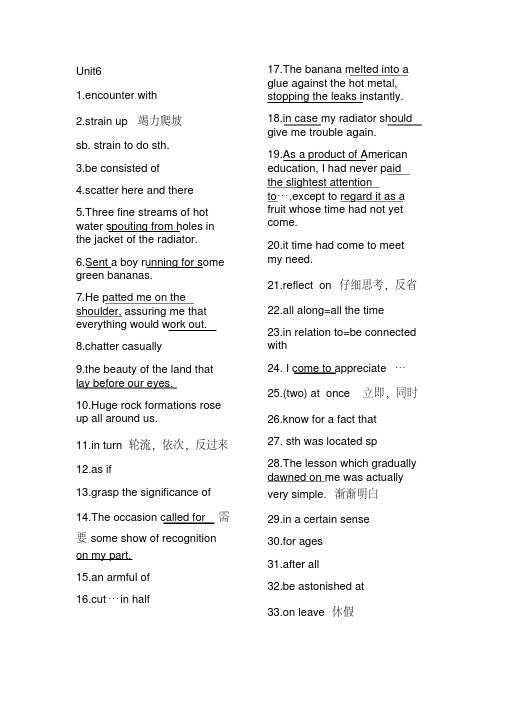
Unit61.encounter with2.strain up 竭力爬坡sb. strain to do sth.3.be consisted of4.scatter here and there5.Three fine streams of hot water spouting from holes in the jacket of the radiator.6.Sent a boy running for some green bananas.7.He patted me on the shoulder, assuring me that everything would work out.8.chatter casually9.the beauty of the land that lay before our eyes.10.Huge rock formations rose up all around us.11.in turn 轮流,依次,反过来12.as if13.grasp the significance of14.The occasion called for 需要some show of recognition on my part.15.an armful of16.cut…in half 17.The banana melted into a glue against the hot metal, stopping the leaks instantly.18.in case my radiator should give me trouble again.19.As a product of American education, I had never paid the slightest attentionto…,except to regard it as a fruit whose time had not yet come.20.it time had come to meet my need.21.reflect on 仔细思考,反省22.all along=all the time23.in relation to=be connected with24. I come to appreciate…25.(two) at once 立即,同时26.know for a fact that27. sth was located sp28.The lesson which gradually dawned on me was actually very simple. 渐渐明白29.in a certain sense30.for ages31.after all32.be astonished at33.on leave 休假Unit 81. come upon sb.2. He had his thumb out andheld a gas can in his otherhand.3. There was a time when …4. somebody in need5. With gangs, drug addicts,murderers, rapists, thieveslurking everywhere,…潜藏6. be stranded in the desert被困在7. What bothered me was that8. rely solely(=only) on9. feed/shelter sbcarry sb down the road10. intrigue sb 激起兴趣11. a cashless journeythrough the land of thealmighty dollar12. accept offers of13. conquer sth14. watch out for 戒备15. people’s readiness tohelp a stranger16. run contrary to 违反17. pull a car to the roadshoulder 18. a trucker pulled over开到路边19. lock brakes hard20. be robbed at knifepointby a hitchhiker21. invite me to a simpledinner22. be grateful to sb for sth23. as a matter of course24. pitch a tent 搭帐篷25. tell you what26. stay-at –home people27. be scheduled to28. run sb over 坑害;与…相撞;违反;不利于;偶遇29. my faith renew30. in spite of31. nip sth in the buds扼杀在萌芽中32. run for 竞选33. head for serious troubleUnit 91. on the beat 在巡逻中2. move up the avenue impressively3. empty the streets4. cast eye down/over/on5. a guardian of the peace6. keep early hours 早睡早起7. long since 很久以前8. make an appointment9. all straight(=true)10. there used to be a restaurant wherethis store stands.11. be torn down 被拆除12. Strike(struck) a match and light(lit)his cigar13. Keen eyes14. Make one’s fortune15. …have our fate worked out and ourfortunes made, whatever they weregoing to be.16. Lose/keep track of each other17. It’s worth it18. He was a kind of slow man, though,good fellow as he was.19. Compete with/against some of thesharpest brains20. Get stuck in sp 全神贯注,陷入21. I’l l be on my way.我将踏上旅途22. A fine, cold rain is falling23. foot passengers in that quarter地区hurried dismally24. fill an appointment25. still in existence 26. know of sth27. arm in arm28. outline the history of his career29. release his arm30. under arrest31. have a chat with32. somehow33. all-night lunch sounter34. turn up35. oddly set36. the wind had risen to a steady blow.37. Make a fine picture of sb38. For show39. Bring up40. Hear from41. Catch up42. Change into43. Ask for44. On earth45. throw off46. speak a word for sb47. keep in step with48. agree with 适合49. leap/jump/rise to one’s feet50. catch on明白理解Unit 101. liberate sb from2. pursue one’s hobbies3. be in pursuit of4. take satisfaction in5. give in to6. feel fulfilled by7. be empty of8. take/find pride in9. at heart本质上10. tend(=look after) sth11. Contact with12. An alternative to13. Though trail and error14. Offer a simple .butenduring satisfaction15. A metaphor for16. Take responsibility for17. Mind one’s work18. At great length=in greatdetail19. Read sth into sth认为…有言外之意20. Place an order for21. Be behind bars=be in jail22. Survive in 23. Cut out 停止,击败,中断,离开24. Bring back to healthy/life25. In some ways在某种程度上26. Provide with27. Supply with28. Remove from29. Ask for permission30. Give oneself up自首31. Give way倒塌,让路,失去控制,撤退Unit 111. gain strength2. not that 到不是说3. upset=knock over4. scatter all over the floor5. poke his face around thecorner6. quiet down7. in search of search for8. it all served to fog my mindwith pleasure.9. In sailed Mrs.Y, wild withanger10. Thrill to sth=be excitedat11. Become restless焦躁不安12. Wake up with a start惊醒13. ears pointed耳朵尖14. it was all for the best15. as busy as a squirrel16. slip into my snowshoes=put on quickly17. drift down18. the snow thickened fast19. a blanket of whitedarkness 20. only too=very21. only to do22. the storm would haveblow itself out23. be smothered by 窒息24. time/place see /witness(no end to ) sth25. slash off 削减26. blood spurted freelyfrom my wound27. the howl seemed tofreeze the world with fear28. work my way out29. take one’s toll onsb.=have a bad effect on30. for life31. leave sth undone32. come into focus33. fan it back to life34. work one’s way out ofUnit 121. help with the milking2. cling to3. the two of us4. a light sleeper5. wide/fully/half awake6. slip back in time7. hate to8. it’s time that sb did…it’s the first time that sbhave done …9. something in sb woke=sbrealize10. take sth for granted =take…as a matter ofcourse11. stumbling blind withsleep12. lay on his side侧躺13. a thought struck sb14. laugh to oneself15. gaze at16. for once17. hang up18. feel for him=try to find19. the words broke fromhim of their own will20. burst withlove/shyness/pride 21. come to think of it22. creep up to23. rush/dash into the room24. steal/sneak/slip into theroom25. worm his way throughthe crowd26. tiptoe/stumble/stagger/creep/crawl into the room 27. as long asUnit 131. have a rough idea ofbe tired of =be bored with=be fed up with2. go ashore3. as it turned out4. a certain look in his eyes5. when wine sinks, wordsswim酒后失言6. Aim at7. The mastery of8. Have no rival9. He was not at all what onewould regard as the figureof a soldier10. Think of war as11. Fulfill our justaspirations12. What if=what wouldhappen if13. Let loose a plague14. Be capable of15. Within our grasp16. If only要是…就好了17. Only if 只有18. Keep at it19. Be determined to do状态20. Be content with 满意21. Inspiration gripped him22. But for要不是23. Sth/sb appeal to sb todo/for sth24. Make an appeal for25. Get on with=continue26. Mark off27. Look close靠近28. Grip sb/grip one’sattention29. Spur on30. Call for31. Depend on32. Regard as33. Get rid of34. Carry out35. Adapt to devoted to36. Be devoted to37. Be different from。
大学英语方面知识点总结

大学英语方面知识点总结在大学英语学习中,我们需要掌握一系列的知识点,包括语法、词汇、阅读、写作、口语等多个方面。
下面将从这些方面逐一总结大学英语的相关知识点。
一、语法语法是英语学习的基础,它包括句子结构、时态、语态、语气、语态等部分,下面将逐一介绍:1. 句子结构英语句子的基本结构包括主语、谓语和宾语。
主语通常是句子的核心,是句子所要表达的主体;谓语表示主语的动作或状态;宾语是主谓的接受者。
这些构成了一个句子的基本结构,要正确运用这些结构,需要掌握一定的语法规则。
2. 时态英语时态有现在时、过去时、将来时等,每种时态都有不同的用法和表达方式。
学习时态必须要掌握好它们的用法,以便正确表达自己的意思。
3. 语态英语有主动语态和被动语态两种形式。
在使用时,要根据具体语境来选择合适的语态,以便更好的表达自己的意思。
4. 语气英语有陈述语气、疑问语气、祈使语气等不同的语气形式,要根据具体情况来选择适当的语气。
以上是语法的基本知识点,要注意,不同语言的语法规则可能会有所不同,所以在学习英语的语法时,要多加练习,以便更好地掌握它。
二、词汇词汇是语言的载体,是表达意思的基本单位。
在大学英语学习中,我们需要大量的词汇来丰富自己的表达能力。
下面是一些词汇方面的知识点:1. 词汇量词汇量是英语学习的基础,要多记背单词,积累词汇量。
2. 词义辨析英语中有很多近义词和同义词,要注意它们的区别和用法,以免用词不当。
不同词汇之间有不同的搭配规律,要了解词汇的搭配用法。
4. 词根词缀英语中许多词的形成和构词法与词根和词缀有关,要学会分辨和理解它们的意义。
以上是词汇的基本知识点,要多加积累和练习,以便更好地掌握和运用它们。
三、阅读阅读是英语学习的重要部分,通过阅读可以扩展词汇,了解文化和习惯,并提高语感和表达能力。
下面是一些阅读方面的知识点:1. 阅读技巧阅读时要掌握一些技巧,如扫读、略读、细读等,以便更好地理解文章和提高阅读速度。
大学英语(2)知识点总结

大学英语(2)知识点总结
大学英语(2)知识点总结:
1. 时态和语态:
- 现在时态、过去时态、将来时态、过去将来时态、现在进行
时态、过去进行时态、将来进行时态、现在完成时态、过去完成时态、将来完成时态等。
- 语态分为主动语态和被动语态,被动语态由助动词“be”加上
及物动词的过去分词构成。
2. 从句:
- 名词性从句包括主语从句、宾语从句、表语从句和同位语从句。
- 定语从句用来修饰名词,关系代词或关系副词引导。
- 状语从句用来修饰整个句子,包括条件状语从句、时间状语
从句、原因状语从句、结果状语从句、目的状语从句和方式状语从句。
3. 名词性考点:
- 可数名词和不可数名词的区别,单数名词和复数名词的变化。
- 名词的所有格形式。
- 特殊名词的复数形式。
4. 动词的时态和语态:
- 动词的各种时态和语态形式的构成,包括动词的各种形式的
变化规则和非谓语动词的用法。
5. 形容词和副词:
- 形容词的比较级和最高级形式,以及有规则和不规则变化。
- 副词的比较级和最高级形式。
6. 介词:
- 常用介词的用法和搭配,包括介词短语在句子中的位置和用法。
7. 连词:
- 并列连词的用法,包括并列关系的句子和拼接句子。
- 从属连词的用法,引导从句和连接主句和从句。
8. 句型结构:
- 祈使句、陈述句、疑问句和感叹句的语法结构和用法。
- 条件句、间接引语和宾语从句的语法结构和用法。
大学英语必修一知识点总结

大学英语必修一知识点总结I. IntroductionCollege English Compulsory One is a fundamental English course designed for university students. The course aims to enhance students' English language proficiency and communication skills, which are essential for their academic studies and future career development. This summary will provide an overview of the key knowledge points covered in the College English Compulsory One course, including grammar, vocabulary, reading, writing, listening, and speaking.II. GrammarGrammar is the foundation of language learning, and mastering grammar rules is crucial for students to communicate effectively in English. In the College English Compulsory One course, students learn about various grammar topics, such as tenses, articles, prepositions, modals, and sentence structure. By understanding and practicing these grammar rules, students can improve their writing and speaking skills, and avoid common grammar mistakes.III. VocabularyExpanding vocabulary is essential for students to comprehend and express ideas in English. Throughout the course, students are exposed to a wide range of vocabulary related to different fields, such as education, technology, environment, and culture. They also learn how to use context clues, word formation, and collocations to enhance their vocabulary acquisition and usage.IV. ReadingReading comprehension is a key component of the College English Compulsory One course. Students are introduced to various reading materials, including academic articles, essays, news reports, and literary works. By analyzing and interpreting these texts, students can improve their reading skills, critical thinking abilities, and cultural awareness.V. WritingWriting is an essential skill for university students, and the College English Compulsory One course focuses on developing students' writing proficiency. Students learn how to structure essays, develop arguments, and use appropriate language and style. They also practice different types of writing, such as descriptive, narrative, expository, and argumentative writing, to effectively communicate their ideas and opinions.VI. ListeningListening comprehension is another vital aspect of English language learning. In the College English Compulsory One course, students engage in various listening activities, such aslectures, speeches, interviews, and podcasts. By honing their listening skills, students can improve their ability to understand spoken English, identify main ideas, and extract relevant information from various audio sources.VII. SpeakingThe College English Compulsory One course also focuses on developing students' speaking skills. Students participate in class discussions, presentations, debates, and role-plays to practice expressing ideas, opinions, and arguments in English. By engaging in these speaking activities, students can enhance their fluency, pronunciation, and communication strategies.VIII. ConclusionIn conclusion, the College English Compulsory One course covers a wide range of knowledge points essential for students to improve their English language skills. By focusing on grammar, vocabulary, reading, writing, listening, and speaking, students can develop a solid foundation in English and advance their academic and professional communication abilities. Mastering these knowledge points will enable students to effectively navigate the academic and professional environments where English is the medium of communication.。
大学英语学术英语知识点总结
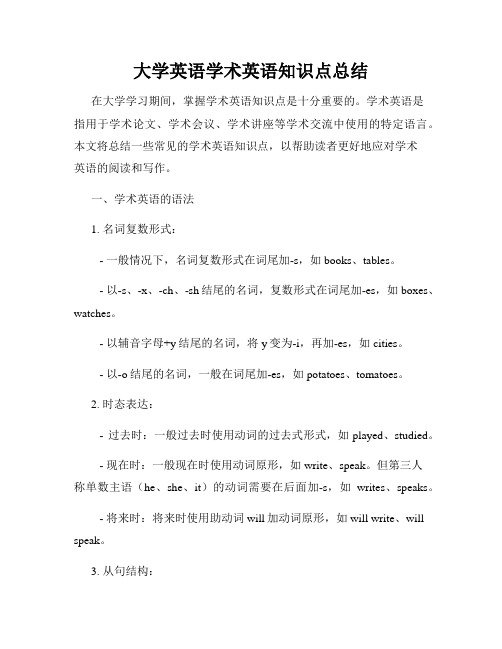
大学英语学术英语知识点总结在大学学习期间,掌握学术英语知识点是十分重要的。
学术英语是指用于学术论文、学术会议、学术讲座等学术交流中使用的特定语言。
本文将总结一些常见的学术英语知识点,以帮助读者更好地应对学术英语的阅读和写作。
一、学术英语的语法1. 名词复数形式:- 一般情况下,名词复数形式在词尾加-s,如books、tables。
- 以-s、-x、-ch、-sh结尾的名词,复数形式在词尾加-es,如boxes、watches。
- 以辅音字母+y结尾的名词,将y变为-i,再加-es,如cities。
- 以-o结尾的名词,一般在词尾加-es,如potatoes、tomatoes。
2. 时态表达:- 过去时:一般过去时使用动词的过去式形式,如played、studied。
- 现在时:一般现在时使用动词原形,如write、speak。
但第三人称单数主语(he、she、it)的动词需要在后面加-s,如writes、speaks。
- 将来时:将来时使用助动词will加动词原形,如will write、will speak。
3. 从句结构:- 定语从句:定语从句用于对名词进行修饰,通常由关系代词或关系副词引导,如that、which、who、where、when。
例如:The book that I borrowed from the library is very interesting.- 时间状语从句:时间状语从句用于表示时间关系,常由when、while、as、before、after等引导。
例如:I will go to bed after I finish my homework.- 结果状语从句:结果状语从句用于表示结果或目的,常由so...that、such...that等引导。
例如:He spoke so fast that I couldn't understand him.二、学术英语的词汇1. 科学名词:- 抽象名词:abstract、hypothesis、methodology、analysis- 实验名词:experiment、sample、data、result- 统计名词:mean、median、mode、standard deviation- 学科名词:biology、chemistry、physics、psychology2. 学术词汇:- 研究:research、study、investigation、analysis- 论文:paper、article、thesis、dissertation- 结论:conclusion、findings、results- 方法:method、approach、technique3. 学术动词:- 分析:analyze、examine、investigate、study- 描述:describe、illustrate、present、show- 讨论:discuss、debate、explore、argue- 提出:propose、suggest、put forward、offer三、学术英语的写作技巧1. 文章结构:- 引言:简要介绍研究背景和目的,引出研究问题。
大学英语重要知识点总结

大学英语重要知识点总结在大学英语学习中,有一些重要的知识点需要我们重点掌握。
这些知识点包括语法、词汇、阅读、写作、听力、口语等方面。
下面我将对这些知识点进行总结。
语法语法是英语学习中非常重要的一部分,它是语言的基础。
掌握好语法知识可以帮助我们正确地理解和运用语言。
在语法方面,我们需要重点掌握英语的时态、语态、句型、语气、语法规则等知识。
时态是英语中一个重要的语法概念,它表示动作或状态发生的时间。
英语中有一般现在时、一般过去时、一般将来时、现在进行时、过去进行时、将来进行时等时态。
语态是表示主语和谓语之间关系的句子形式。
英语中有主动语态和被动语态两种语态。
句型指的是句子的基本结构,包括陈述句、疑问句、祈使句、感叹句等。
语气是句子中表达说话人的态度或语气的一种特殊形式。
在语法规则方面,主要包括主谓一致、从句、并列句、倒装句等内容。
词汇词汇是语言中的重要组成部分,没有足够的词汇量就无法进行有效的交流。
因此,我们需要尽量扩大自己的词汇量。
在学习词汇时,我们可以通过背单词、多阅读、多听英语材料来增加词汇量。
此外,我们还需要了解词汇的拼写、发音、词义、词性等知识。
在词汇的掌握上,可以通过积累常用词组、固定搭配、短语等方式来加深对词汇的理解和应用。
阅读阅读是提高英语水平的一个重要途径,通过阅读可以丰富我们的知识,提高我们的语言表达能力。
在阅读理解方面,我们需要掌握一些阅读技巧,比如快速阅读、细节阅读、主旨大意理解、推断词义等技巧。
同时,我们还需要了解文章的结构、论点、观点、逻辑关系等内容。
对于不同类型的文章,比如新闻报道、科技文献、广告宣传、社会评论等,我们需要掌握不同的阅读技巧。
写作写作是英语学习中的一个重要环节,通过写作可以加深对语言的理解和运用。
在写作方面,我们需要重点关注写作结构、写作技巧、写作方式等问题。
写作结构包括文章的开头、中间和结尾部分,需要有清晰的组织和逻辑。
写作技巧包括如何表达自己的观点、如何展开论述、如何使用逻辑推理等。
大一大学综合英语知识点
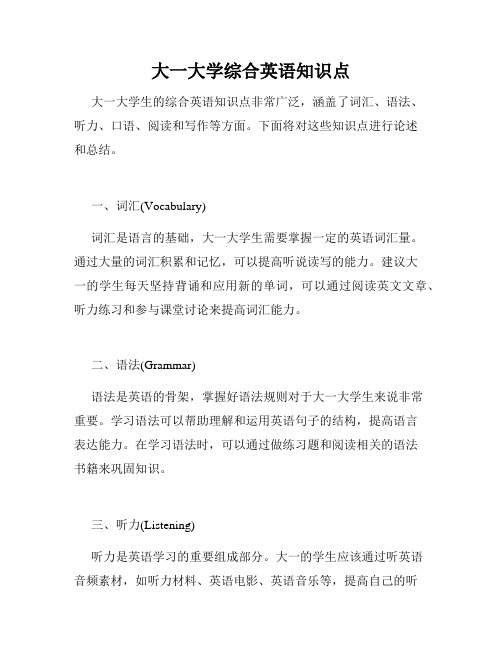
大一大学综合英语知识点大一大学生的综合英语知识点非常广泛,涵盖了词汇、语法、听力、口语、阅读和写作等方面。
下面将对这些知识点进行论述和总结。
一、词汇(Vocabulary)词汇是语言的基础,大一大学生需要掌握一定的英语词汇量。
通过大量的词汇积累和记忆,可以提高听说读写的能力。
建议大一的学生每天坚持背诵和应用新的单词,可以通过阅读英文文章、听力练习和参与课堂讨论来提高词汇能力。
二、语法(Grammar)语法是英语的骨架,掌握好语法规则对于大一大学生来说非常重要。
学习语法可以帮助理解和运用英语句子的结构,提高语言表达能力。
在学习语法时,可以通过做练习题和阅读相关的语法书籍来巩固知识。
三、听力(Listening)听力是英语学习的重要组成部分。
大一的学生应该通过听英语音频素材,如听力材料、英语电影、英语音乐等,提高自己的听力水平。
同时,可以参加听力训练班或组织听力交流活动,培养自己的听力技巧和能力。
四、口语(Speaking)口语是大一大学生英语学习的重点和难点之一。
学生应该积极参与口语练习,与同学或外教进行对话,加强口语交流能力。
此外,可以利用网络资源,如英语角、在线英语对话平台等,提高口语表达能力。
五、阅读(Reading)阅读是提高英语水平的有效途径之一。
学生可以阅读大量的英文材料,如英文报纸、杂志、网络文章等,培养自己的阅读能力。
在阅读过程中,要有意识地学习和记忆生词,加深对文章中内容的理解。
六、写作(Writing)写作是大一大学生英语学习的重点,也是提高综合能力的关键。
学生应该积极参与写作练习,包括写作文、日记、作业和论文等。
可以通过学习写作技巧和模仿优秀的范文,提高自己的写作水平。
综上所述,大一大学英语综合知识点包括词汇、语法、听力、口语、阅读和写作等方面。
学生应该注重练习和应用,通过不断地积累和提高,提升自己的英语水平,为后续的学习和工作打下良好的基础。
- 1、下载文档前请自行甄别文档内容的完整性,平台不提供额外的编辑、内容补充、找答案等附加服务。
- 2、"仅部分预览"的文档,不可在线预览部分如存在完整性等问题,可反馈申请退款(可完整预览的文档不适用该条件!)。
- 3、如文档侵犯您的权益,请联系客服反馈,我们会尽快为您处理(人工客服工作时间:9:00-18:30)。
Unit6withup 竭力爬坡sb. strain to do sth.consisted ofhere and therefine streams of hot water spouting from holes in the jacket of the radiator.a boy running for some green bananas.patted me on the shoulder, assuring me that everything would work out.casuallybeauty of the land that lay before our eyes.rock formations rose upall around us.turn 轮流,依次,反过来ifthe significance ofoccasion called for 需要some show of recognition on my part.armful of…in half banana melted into a glue against the hot metal, stopping the leaks instantly.case my radiator should give me trouble again.a product of American education, I had never paid the slightest attention to…,except to regard it as a fruit whose time had not yet come.time had come to meet my need.on 仔细思考,反省along=all the timerelation to=be connected with24. I come to appreciate…25.(two) at once 立即,同时for a fact that27. sth was located splesson which gradually dawned on me was actually very simple. 渐渐明白a certain senseagesallastonished atleave 休假Unit 8e upon sb.2.He had his thumb out andheld a gas can in hisother hand.3.There was a time when …4.somebody in need5.With gangs, drug addicts,murderers, rapists,thieves lurkingeverywhere,…潜藏6.be stranded in thedesert 被困在7.What bothered me wasthat8.rely solely(=only) on9.feed/shelter sbcarry sb down the road10.intrigue sb 激起兴趣11. a cashless journeythrough the land of thealmighty dollar12.accept offers of13.conquer sth14.watch out for 戒备15.people’s readinessto help a stranger 16.run contrary to 违反17.pull a car to theroad shoulder18. a trucker pulled over开到路边19.lock brakes hard20.be robbed atknifepoint by ahitchhiker21.invite me to a simpledinner22.be grateful to sb forsth23.as a matter of course24.pitch a tent 搭帐篷25.tell you what26.stay-at –home people27.be scheduled to28.run sb over 坑害;与…相撞;违反;不利于;偶遇29.my faith renew30.in spite of31.nip sth in the buds扼杀在萌芽中32.run for 竞选33.head for serioustroubleUnit 91.on the beat 在巡逻中2.move up the avenue impressively3.empty the streets4.cast eye down/over/on5. a guardian of the peace6.keep early hours 早睡早起7.long since 很久以前8.make an appointment9.all straight(=true)10.there used to be a restaurantwhere this store stands.11.be torn down 被拆除12.Strike(struck) a match andlight(lit) his cigar13.Keen eyes14.Make one’s fortune15.…have our fate worked out andour fortunes made, whatever they were going to be.16.Lose/keep track of each other17.It’s worth it18.He was a kind of slow man,though, good fellow as he was.pete with/against some ofthe sharpest brains20.Get stuck in sp 全神贯注,陷入21.I’ll be on my way.我将踏上旅途22.A fine, cold rain is falling23.foot passengers in that quarter地区 hurried dismally24.fill an appointment25.still in existence26.know of sth27.arm in arm28.outline the history of hiscareer29.release his arm30.under arrest31.have a chat with32.somehow33.all-night lunch sounter34.turn up35.oddly set36.the wind had risen to a steadyblow.37.Make a fine picture of sb38.For show39.Bring up40.Hear from41.Catch up42.Change into43.Ask for44.On earth45.throw off46.speak a word for sb47.keep in step with48.agree with 适合49.leap/jump/rise to one’s feet50.catch on明白理解Unit 101.liberate sb from2.pursue one’s hobbies3.be in pursuit of4.take satisfaction in5.give in to6.feel fulfilled by7.be empty of8.take/find pride in9.at heart本质上10.tend(=look after) sth11.Contact with12.An alternative to13.Though trail anderror14.Offer a simple .butenduring satisfaction 15. A metaphor for 16.Take responsibilityfor17.Mind one’s work18.At great length=ingreat detail19.Read sth into sth认为…有言外之意20.Place an order for21.Be behind bars=be injail22.Survive in23.Cut out 停止,击败,中断,离开24.Bring back to healthy/life25.In some ways在某种程度上26.Provide with27.Supply with28.Remove from29.Ask for permission30.Give oneself up自首31.Give way倒塌,让路,失去控制,撤退Unit 111.gain strength2.not that 到不是说3.upset=knock over4.scatter all over thefloor5.poke his face around thecorner6.quiet down7.in search of searchfor8.it all served to fog mymind with pleasure.9.In sailed , wild withanger10.Thrill to sth=beexcited at11.Become restless焦躁不安12.Wake up with a start惊醒13.ears pointed耳朵尖14.it was all for thebest15.as busy as a squirrel16.slip into my snowshoes=put on quickly17.drift down18.the snow thickenedfast19. a blanket of whitedarkness20.only too=very21.only to do22.the storm would haveblow itself out23.be smothered by 窒息24.time/place see/witness (no end to )sth25.slash off 削减26.blood spurted freelyfrom my wound27.the howl seemed tofreeze the world withfear28.work my way out29.take one’s toll onsb.=have a bad effecton30.for life31.leave sth undonee into focus33.fan it back to life34.work one’s way outofUnit 121.help with the milking2.cling to3.the two of us4.a light sleeper5.wide/fully/half awake6.slip back in time7.hate to 8.it’s time that sb did…it’s the first timethat sb have done …9.something in sb woke=sbrealize10.take sth for granted= take…as a matter ofcourse11.stumbling blind withsleepy on his side侧躺13. a thought struck sbugh to oneself15.gaze at16.for once17.hang up18.feel for him=try tofind19.the words broke fromhim of their own will20.burst withlove/shyness/pridee to think of it22.creep up to23.rush/dash into theroom24.steal/sneak/slip intothe room25.worm his way throughthe crowd26.tiptoe/stumble/stagger/creep/crawl into theroom27.as long asUnit 131.have a rough idea ofbe tired of =be boredwith= be fed up with2.go ashore3.as it turned out4.a certain look in hiseyes5. when wine sinks, wordsswim酒后失言6. Aim at7.The mastery of8.Have no rival9.He was not at all whatone would regard as the figure of a soldier10.Think of war as11.Fulfill our justaspirations12.What if=what wouldhappen if13.Let loose a plague14.Be capable of15.Within our grasp16.If only要是…就好了17.Only if 只有18.Keep at it19.Be determined to do状态20.Be content with 满意21.Inspiration grippedhim22.But for要不是23.Sth/sb appeal to sbto do/for sth24.Make an appeal for25.Get on with=continue26.Mark off27.Look close靠近28.Grip sb/grip one’sattention29.Spur on30.Call for31.Depend on32.Regard as33.Get rid of34.Carry out35.Adapt to devoted to36.Be devoted to37.Be different from。
